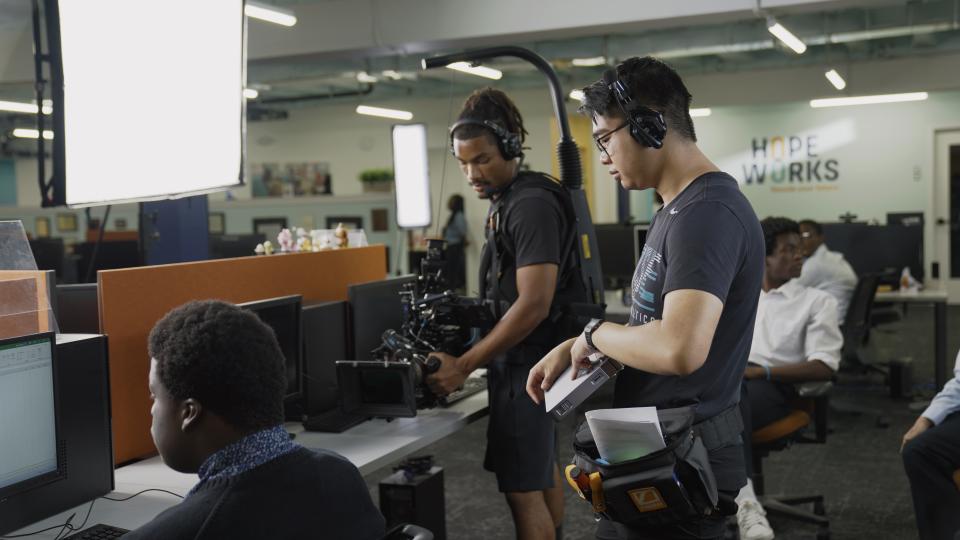Universal Studio Group Chairman Pearlena Igbokwe Featured as One of InStyle's Women of Impact
Universal Studio Group Chairman Pearlena Igbokwe sat down with InStyle to discuss her early love for TV, her path to leading USG and her thoughts on the legacy she hopes to build.

August 16, 2024
Story by Emily Forney, originally published in InStyle on August 13, 2024
It’s marrying the actual with the aspirational. To provide language for murky experiences and complicated emotions. To entertain, to educate, to provide escape. As Universal Studio Group chairman, Pearlena Igbokwe, puts it, her role as a storyteller and developer is layered and significant. Her goal to create amazing television is intrinsically tied to her responsibility to showcase community experiences both as they are and as they could be.
Today, Igbokwe oversees 103 series in her role at the helm of Universal Television, Universal Content Productions, and Universal Television Alternative and International Studios, for platforms such as Peacock, Prime Video, and NBC, collaborating with writers and producers to develop, produce, and sell projects. During her lifetime in entertainment, she’s been a part of titan shows such as Soul Food, Will & Grace, The Office, and This Is Us. But before she was working with Jordan Peele or brainstorming with up-and-coming showrunners, she was first a young, never-missed-an-episode TV enthusiast.
For much of her adolescent life, Igbokwe didn’t view the entertainment business as a career path. Television wasn’t on her radar as something she could aspire to be a part of, or a place to take up space in; it was, at first, an escape. “I was born in Nigeria and I came to this country as a young kid. And it was just that TV was fascinating. It was this box of pictures with people and worlds, and it was how I got acclimated to this country. I say TV became my best friend, my teacher,” says Igbokwe, who was navigating how to grow up as an immigrant in America, where her classmates propagated harmful stereotypes rooted in an ignorance of Black culture. So she made a habit of grabbing the TV Guide as a teenager, planning out her viewing schedule each week, and seeking companionship with stories that were both comforting and ambitious.
Her interest in storytelling ranged from specials on PBS to cult classic movies from AMC. High and low quality, she consumed it all. She was most intrigued by the craft and beats of a story, and how someone could translate human emotion to a screen.
It was the summer after her sophomore year of college when she saw a job posting at NBC’s 30 Rockefeller Center headquarters for summer associates. “It was a program specifically to bring in diverse students to work in the different departments and expose us to the business. It was revelatory and eye opening,” she says. She was giddy to work at a network that housed all her favorite shows at the time.
After graduating Yale with an undergraduate degree in English and a mountain of student loan debt, Igbokwe sought out some monetary stability, taking a job in financial services; later, she was accepted to business school at Columbia. But in the back of her mind, she knew she would return to entertainment, but now on the business side of things. She realized that, while she respected writers and other creatives, she never saw herself as one—but she did see herself as the person who could help make an idea a reality.
While in business school, Igbokwe worked for HBO and left graduation with two job offers, one from the former and another from Showtime. Igbokwe accepted a position in Showtime’s marketing department, where she laid the groundwork for everything to come. Igbokwe’s experience in marketing informs how she approaches all her programming now; her primary focus is to understand how to connect with an audience. She is hyper aware of the influence television can have and, while she looks to provide entertainment and at times a reprieve, there’s no doubt television builds community and shapes identity. “We aren’t curing cancer, we aren’t doing rocket science, but we are providing something for people emotionally. So you want to take care with how we make these [shows].”
Igbokwe spent two years in marketing and another two in special projects before she made the jump to programming. She confidently reminisces, “You couldn’t tell me I wasn’t going to be a success. I prepared myself for the opportunity, ran with it, and never looked back.”
Her ultimate goal—and mandate—is to make good shows. Period. But she refuses to discount marginalized creators who haven’t found success for lack of time, support, and resources. “I think there’s a pressure for diverse storytellers, because we don’t think we’ll get as many shots,” says Igbokwe, who has literal lists of diverse showrunners, directors, and writers she throws down when others claim there are none of merit to work with. “And if something fails, people are so quick to say ‘Well, you failed so no one wants this kind of story.’ But you’ll know when you’ve arrived when you can be mediocre and successful, failed and still get another shot. And often it feels like that’s a luxury that’s not always afforded to everyone.”
Igbokwe understands both the privilege she has to be in her position, but also the Otherness she faces.









